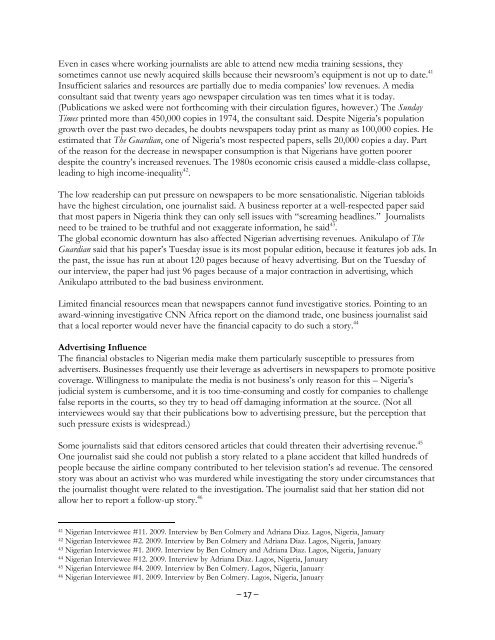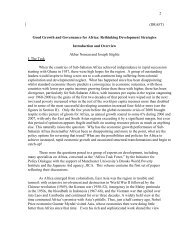Limited resourcesApart from their personal remuneration, Nigerian journalists face a variety of technical obstacles totheir work, including a general lack of non-monetary resources.Joke Kujenya, a business reporter at The Nation, said that the biggest challenge she faces is the“challenge of infrastructure.” Nigerian journalists lack the proper tools to do the job, she said. Shesaid that newspapers do not provide adequate computers and other technology, and mostjournalists’ salaries are too low to buy these tools <strong>for</strong> themselves. Even at some of Nigeria’s topnewspapers there are not enough computers in a newsroom <strong>for</strong> everyone to have access at the sametime. 38 Kujenya cited the newly established Next newspaper, founded by Pulitzer Prize winner DeleOlojede, as one exception. Olojede “came with all the tools” to start up Next, Kujenya said. Mostnewsrooms, however, lack essential resources <strong>for</strong> reporting. Personal laptops are rare. Kujenya saidthat her co-workers were extremely excited when she showed them a digital recorder that shebought in the U.S. “It shouldn’t be a big deal,” she said.Slow Internet access is another major problem journalists identified. All newsrooms are linked to theInternet, but the bandwidth is low. Our researches heard of many instances where slow Internet wasa serious burden on reporters. During the U.S. presidential election, <strong>for</strong> example, Jahman Anikulapo,the Sunday editor of The Guardian, a major paper, said he was unable to get online to downloadspeech transcripts and other in<strong>for</strong>mation. (Anikulapo said that his paper just switched to a newInternet provider, which might lead to an improvement.) Slow Internet access also makes it difficultto cover crises that demand reactive coverage.Slow Internet makes research and fact-checking arduous, which leads to increased dependence onuncorroborated in<strong>for</strong>mation that sources single-handedly provide. In these cases, one televisionjournalist said she simply has to trust that the source’s in<strong>for</strong>mation is accurate. It is common <strong>for</strong>journalists to draw in<strong>for</strong>mation from other media stories, as well. 39The limitations of the Internet go beyond low bandwidth. Many journalists lack adequate training<strong>for</strong> the Internet and new media. One professor said that university programs rarely teach new media– at most, schools offer one or two classes. He is just now introducing these tools into hiscurriculum. Though he said that new journalism schools are more progressive, when he proposedoffering a new media course at his university, faculty did not understand new media’s relevance tojournalism. Even among his students, he said, there is resistance to the Internet. As an antidote, theprofessor requires that his students have e-mail addresses and do research online. 40One editor-in-chief of a business newspaper was thrilled to show us an exciting program he learnedabout at a recent journalism training. Our researchers were a bit surprised to learn that this programwas Microsoft Excel, which we had mistakenly thought was almost as well known as MicrosoftWord.38 Nigerian Interviewee #9. 2009. Interview by Ben Colmery. Lagos, Nigeria, January39 Nigerian Interviewee #10. 2009. Interview by Ben Colmery and Adriana Diaz. Lagos, Nigeria, January40 Nigerian Interviewee #7. 2009. Interview by Ben Colmery and Adriana Diaz. Lagos, Nigeria, January– 16 –
Even in cases where working journalists are able to attend new media training sessions, theysometimes cannot use newly acquired skills because their newsroom’s equipment is not up to date. 41Insufficient salaries and resources are partially due to media companies’ low revenues. A mediaconsultant said that twenty years ago newspaper circulation was ten times what it is today.(Publications we asked were not <strong>for</strong>thcoming with their circulation figures, however.) The SundayTimes printed more than 450,000 copies in 1974, the consultant said. Despite Nigeria’s populationgrowth over the past two decades, he doubts newspapers today print as many as 100,000 copies. Heestimated that The Guardian, one of Nigeria’s most respected papers, sells 20,000 copies a day. Partof the reason <strong>for</strong> the decrease in newspaper consumption is that Nigerians have gotten poorerdespite the country’s increased revenues. The 1980s economic crisis caused a middle-class collapse,leading to high income-inequality 42 .The low readership can put pressure on newspapers to be more sensationalistic. Nigerian tabloidshave the highest circulation, one journalist said. A business reporter at a well-respected paper saidthat most papers in Nigeria think they can only sell issues with “screaming headlines.” Journalistsneed to be trained to be truthful and not exaggerate in<strong>for</strong>mation, he said 43 .The global economic downturn has also affected Nigerian advertising revenues. Anikulapo of TheGuardian said that his paper’s Tuesday issue is its most popular edition, because it features job ads. Inthe past, the issue has run at about 120 pages because of heavy advertising. But on the Tuesday ofour interview, the paper had just 96 pages because of a major contraction in advertising, whichAnikulapo attributed to the bad business environment.Limited financial resources mean that newspapers cannot fund investigative stories. Pointing to anaward-winning investigative CNN Africa report on the diamond trade, one business journalist saidthat a local reporter would never have the financial capacity to do such a story. 44Advertising InfluenceThe financial obstacles to Nigerian media make them particularly susceptible to pressures fromadvertisers. Businesses frequently use their leverage as advertisers in newspapers to promote positivecoverage. Willingness to manipulate the media is not business’s only reason <strong>for</strong> this – Nigeria’sjudicial system is cumbersome, and it is too time-consuming and costly <strong>for</strong> companies to challengefalse reports in the courts, so they try to head off damaging in<strong>for</strong>mation at the source. (Not allinterviewees would say that their publications bow to advertising pressure, but the perception thatsuch pressure exists is widespread.)Some journalists said that editors censored articles that could threaten their advertising revenue. 45One journalist said she could not publish a story related to a plane accident that killed hundreds ofpeople because the airline company contributed to her television station’s ad revenue. The censoredstory was about an activist who was murdered while investigating the story under circumstances thatthe journalist thought were related to the investigation. The journalist said that her station did notallow her to report a follow-up story. 4641 Nigerian Interviewee #11. 2009. Interview by Ben Colmery and Adriana Diaz. Lagos, Nigeria, January42 Nigerian Interviewee #2. 2009. Interview by Ben Colmery and Adriana Diaz. Lagos, Nigeria, January43 Nigerian Interviewee #1. 2009. Interview by Ben Colmery and Adriana Diaz. Lagos, Nigeria, January44 Nigerian Interviewee #12. 2009. Interview by Adriana Diaz. Lagos, Nigeria, January45 Nigerian Interviewee #4. 2009. Interview by Ben Colmery. Lagos, Nigeria, January46 Nigerian Interviewee #1. 2009. Interview by Ben Colmery. Lagos, Nigeria, January– 17 –
- Page 1 and 2: THEREWILLBE INKA study of journalis
- Page 3 and 4: AcknowledgementsThis paper has bene
- Page 7 and 8: Executive SummaryPurpose of the Rep
- Page 9 and 10: journalists in these countries that
- Page 11 and 12: Existing International Training Opp
- Page 13 and 14: • Consumer Affairs and Informatio
- Page 15 and 16: Background 3Of the three countries
- Page 17 and 18: pervasive conflict in the Niger Del
- Page 19 and 20: 3) Crises or disruptions, where som
- Page 21: Low pay and low regardOne of the mo
- Page 25 and 26: But while some reporters think FOIB
- Page 27 and 28: When asked how much the media could
- Page 29 and 30: the effects of these challenges for
- Page 31 and 32: detailed analysis of the opportunit
- Page 33 and 34: journalist said he has, however,
- Page 35 and 36: completely make use of some of the
- Page 37 and 38: money. Their knowledge of what medi
- Page 39 and 40: Notes on conducting research in Nig
- Page 41 and 42: Ghana- 35 -
- Page 43 and 44: evenues each year,” 106 which wou
- Page 45 and 46: entertainment news, scandals, and p
- Page 47 and 48: The rise of business-focused journa
- Page 49 and 50: coverage of the oil industry is als
- Page 51 and 52: needed supplementary income to cash
- Page 53 and 54: as supporting one political party o
- Page 55 and 56: Numerous journalists recounted how
- Page 57 and 58: Training programs available to busi
- Page 59 and 60: Amos Safo, editor-in-chief at the p
- Page 61 and 62: Notes on conducting research in Gha
- Page 63 and 64: Background 136Literacy and Educatio
- Page 65 and 66: “sufficient information” about
- Page 67 and 68: or criminal charges for content the
- Page 69 and 70: have such difficulty obtaining info
- Page 71 and 72: The majority of those interviewed b
- Page 73 and 74:
commitment to their profession and
- Page 75 and 76:
Notes on Conducting Research in Uga
- Page 77 and 78:
Recommendations for Revenue Watch I
- Page 79 and 80:
people who have no journalism backg
- Page 81 and 82:
analyzes business,” he said, “e
- Page 83 and 84:
A journalist with The Punch said,
- Page 85 and 86:
The Media Foundation for West Afric
- Page 87 and 88:
Length of TrainingRoughly three-qua
- Page 89 and 90:
industries, for instance, ought to
- Page 91 and 92:
otherwise being published in the pr
- Page 93 and 94:
Non-Training Recommendations for Ug
- Page 95 and 96:
Appendix A: NigeriaPotential Partne
- Page 97 and 98:
journalists. Biakolo is very profes
- Page 99 and 100:
Television Stations• Nigerian Tel
- Page 101 and 102:
have two to four month professional
- Page 103 and 104:
City: AccraTelephone: +233 (021) 22
- Page 105 and 106:
Fax: +256 414 255 495E-mail: umdf@a
- Page 107 and 108:
• What do you think are the most
- Page 109 and 110:
Appendix E: Survey Questions1. Name
- Page 111 and 112:
18. How effective were the teaching
- Page 113 and 114:
28. What are the most important cha
- Page 115 and 116:
1. Journalists by Country2. How wou
- Page 117 and 118:
5. How often do you travel out of t
- Page 119 and 120:
9. Which organization(s) sponsored
- Page 121:
12. After completing the training(s














